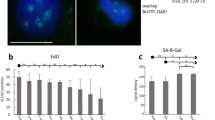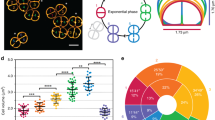Abstract
BY means of an improved toluidine blue–molybdate staining procedure1 two types of ribonucleoprotein (RNP) can be very clearly demonstrated in the nucleolus. One type is the pars amorpha and the other consists of minute granules or hollow spheres and appears to correspond to the nucleolini of classical cytologists2. Enlargement of the nucleolini has been observed in cells infected with viruses and in cells in which the onset of mitosis is blocked by large doses of colchicine3. The relationship between the changes in the nucleolini and nucleic acid metabolism is not clear in these systems. An examination of the nucleolar RNP was therefore undertaken in cells treated with 5-fluorodeoxyuridine (FUDR) since the metabolic changes produced by this antimetabolite have been extensively studied. FUDR inhibits synthesis of deoxyribonucleic acid (DNA) by blocking the formation of thymidylic acid4,5. When cells in tissue culture are treated with FUDR, DNA synthesis is prevented, cell division is arrested and the metabolism of ribonucleic acid (RNA) is disturbed6,7. During one generation time of HeLa cells, the DNA per cell remains constant, the cytoplasmic RNP doubles and the nuclear RNP is unchanged. Salzman and Sebring provide evidence that the effect of FUDR on RNA metabolism of HeLa cells is mediated through its effect on DNA synthesis since the process is reversed by thymidine, but not by uridine7.
This is a preview of subscription content, access via your institution
Access options
Subscribe to this journal
Receive 51 print issues and online access
$199.00 per year
only $3.90 per issue
Buy this article
- Purchase on Springer Link
- Instant access to full article PDF
Prices may be subject to local taxes which are calculated during checkout
Similar content being viewed by others
References
Love, R., J. Histochem., 10, 227 (1962).
Love, R., and Bharadwaj, T. P., Nature, 183, 1453 (1959).
Love, R., Proc. Amer. Assoc. Cancer Res., 3, 340 (1962).
Cohen, S. S., Flaks, J. G., Barner, H. D., Loel, M. R., and Lichtenstein, J., Proc. U.S. Nat. Acad. Sci., 44, 1004 (1958).
Bosch, L., Harbers, E., and Heidelberger, C., Cancer Res., 18, 335 (1958).
Paul, J., and Hagiwara, A., Biochim. Biophys. Acta, 61, 243 (1962).
Salzman, N. P., and Sebring, E. D., Biochim. Biophys. Acta, 61, 406 (1962).
Wildy, P., Smith, C., Newton, A. A., and Dendy, P., Virology, 15, 486 (1961).
Salzman, N. P., and Sebring, E. D., Arch. Biochem. Biophys., 84, 143 (1959).
Littman, M. L., and Miwatani, T., Cancer Chemotherap. Rep., 16, 353 (1962).
Sibatani, A., de Kloet, S. R., Allfrey, V. G., and Mirsky, A. E., Proc. U.S. Nat. Acad. Sci., 48, 471 (1962).
Sirlin, J. L., Jacob, J., and Kato, K.-I., Exp. Cell Res., 27, 355 (1962).
Author information
Authors and Affiliations
Rights and permissions
About this article
Cite this article
LOVE, R., WALSH, R. Changes in the Ribonucleoproteins of the Nucleolus following Inhibition of Synthesis of Deoxyribonucleic Acid. Nature 197, 795–796 (1963). https://doi.org/10.1038/197795a0
Issue Date:
DOI: https://doi.org/10.1038/197795a0
This article is cited by
Comments
By submitting a comment you agree to abide by our Terms and Community Guidelines. If you find something abusive or that does not comply with our terms or guidelines please flag it as inappropriate.



